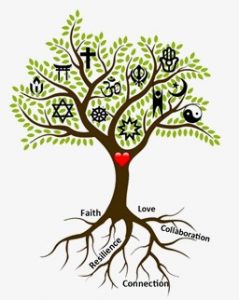 The Chicagoland Trauma Informed Congregations Network
The Chicagoland Trauma Informed Congregations Network
The Chicagoland Trauma-Informed Congregation Network is an interfaith table that brings together faith-rooted organizations and others that are interested in using our collective wisdom to respond to the call to facilitate and deepen the role of faith communities in recognizing and creating “safe and brave spaces” that support the healing of trauma experienced by individuals and communities. The Network is not a direct service provider, but a vehicle for education, skills transfer and connection of the intersection of faith, trauma and restorative justice.
There are many ways to get involved. You choose how you want to participate.
- Check out Healing Congregations: Nurturing Love, Life, and Hope in a Hurting World. This is a book of stories that raises questions about what it means to live as a person of faith where hurt and hope meet. Download the book, listen to the stories, follow our Road Maps to study and wrestle with your own questions. Find more here.
- Be part of our Community of Practice, which includes gatherings, conferences, events, and more.
- Join our Planning Team. This group meets monthly to map out what work we want to do and how we want to do it. All are welcome, no matter how much experience of “expertise” you have. Contact Kirsten Peachey if you’d like to be added to the planning team group list at kirsten.peachey@aah.org.
- Read our blog.
- Submit a story. The diverse and fascinating work of the faith and health movement is usually driven out of the passion and commitment of those doing the work. We want to capture the experience and wisdom that lies underneath the work so that we can all learn from it and continue to be inspired.
- Join the CTICN newsletter mailing list by clicking here.
- Join the Restorative Justice Practices Group. Nehemiah Trinity Rising provides education about restorative justice practices, skills for using such practices, and helps organizations try out restorative justice practices in their own settings.
- Learn about trauma, resilience and what faith communities can do.
- Learn about the Five Healing Gestures that you can practice with children in your congregation and community. New research shows that witnessing traumatic events, like domestic violence, shootings, or even fighting, can impact the physical development of a child’s brain — potentially leading to lifelong health and social issues. But you can help reverse the effects. This site will teach you about the science of childhood trauma, and how five everyday gestures can make a world of difference.
- Schedule a Risking Connection in Faith Communities Workshop. Risking Connection explores:
- What trauma is and the science of how it affects us;
- How relationships are at the heart of healing;
- Spirituality and trauma;
- How we can take care of ourselves as we journey with others who have experienced difficulty and pain;
- What we can do together as a community of faith to prevent trauma and restore hope.
Contact Kirsten Peachey at kirsten.peachey@aah.org to learn more.



